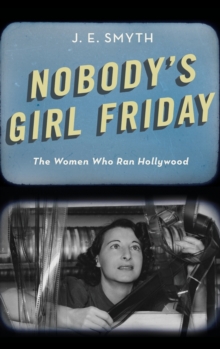Description
| Product ID: | 9780190840822 |
| Product Form: | Hardback |
| Country of Manufacture: | US |
| Title: | Nobody's Girl Friday |
| Subtitle: | The Women Who Ran Hollywood |
| Authors: | Author: J. E. Smyth |
| Page Count: | 328 |
| Subjects: | Filmmaking and production: technical and background skills, Film production: technical & background skills, Gender studies: women and girls, Film, TV and Radio industries, Gender studies: women, Cinema industry, California, c 1918 to c 1939 (Inter-war period), c 1939 to c 1945 (including WW2) |
| Description: | Select Guide Rating The first comprehensive history of Hollywood's high-flying career women during the studio era, Nobody's Girl Friday covers the impact of the executives, producers, editors, writers, agents, designers, directors, and actresses who shaped Hollywood film production and style. Looking back on her career in 1977, Bette Davis remembered with pride, "Women owned Hollywood for twenty years." She had a point. Between 1930 and 1950, over 40% of film industry employees were women, 25% of all screenwriters were female, two women supervised all studio feature output and could order retakes on any director''s work, one woman ran MGM behind the scenes, over a dozen women worked as producers, a woman headed the Screen Writers Guild three times, and press claimed Hollywood was a generation or two ahead of the rest of the country in terms of gender equality and employment. But historians, critics, and the public have largely forgotten this era and persist in seeing studio-era Hollywood as a place where the only career open to a woman was as a passive, pretty face on screen or an underpaid, anonymous secretary. J. E. Smyth tells another story of a "golden age" for women''s employment in the film industry and of Hollywood''s ranks of powerful organization women. The first comprehensive history of Hollywood''s high-flying career women during the studio era (1924-1956), Nobody''s Girl Friday covers the impact of the executives, producers, editors, writers, agents, designers, directors, and actresses who shaped Hollywood film production and style, led their unions, climbed to the top during the war, and fought the blacklist. It focuses on women who called the shots at various levels of film production and articulated shifting attitudes toward gender, work, power, and politics, including executive Anita Colby, chief story editor Eve Ettinger, story editor and agent Kay Brown, secretary Ida Koverman, editor Barbara McLean, producers Harriet Parsons, Constance Bennett, and Virginia Van Upp, screenwriter and Screen Writers Guild President Mary C. McCall Jr., columnists Hedda Hopper, designer Dorothy Jeakins, agent Mary Baker, and President of the Hollywood Canteen and actor, Bette Davis. Many of the women featured in this book were influential during their lifetimes, politically active, heading committees in their professional guilds, and giving numerous PR interviews to syndicated journalists, and publicly supporting other women regardless of political affiliation. However, they were subsequently cut from mainstream academic and popular histories of the industry, or, as in Hopper''s case, labeled as career-destroying, anti-communist viragos. Based on a decade of archival research, Smyth uncovers a formidable generation working within the American film industry and brings their voices back into the history of Hollywood. Their achievements, struggles, and perspectives fundamentally challenge popular ideas about director-based auteurism, male dominance, and female disempowerment in the years between First and Second Wave Feminism. Nobody''s Girl Friday is a revisionist history, but it''s also a deeply personal, collective account of hundreds of working women, the studios they worked for, and the films they helped to make. For many years, historians and critics have insisted that both American feminism and the power of women in Hollywood declined and virtually disappeared from the 1920s through the 1960s. But Smyth vindicates Bette Davis''s claim. The story of the women who called the shots in studio-era Hollywood has never fully been told-until now. |
| Imprint Name: | Oxford University Press Inc |
| Publisher Name: | Oxford University Press Inc |
| Country of Publication: | GB |
| Publishing Date: | 2018-05-31 |


